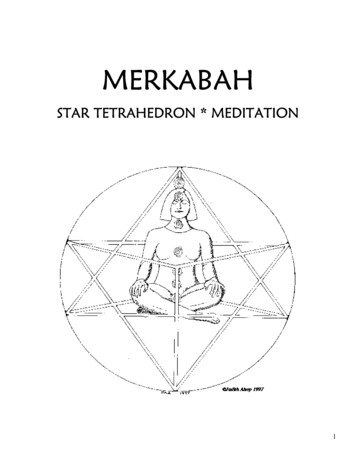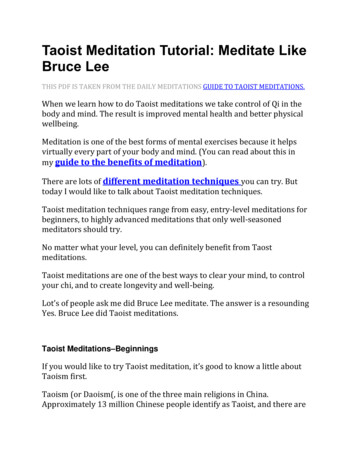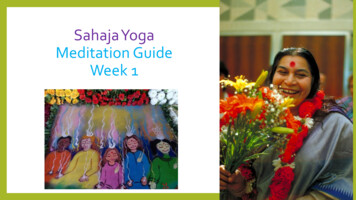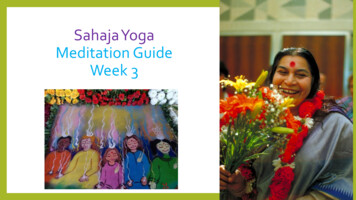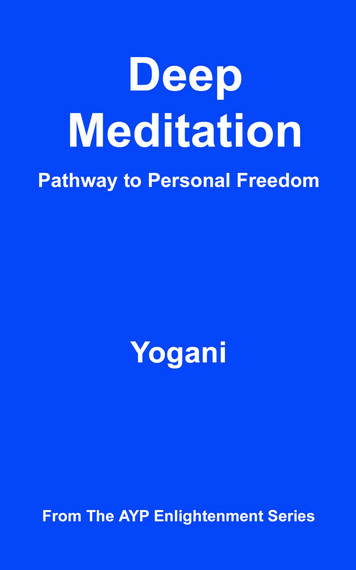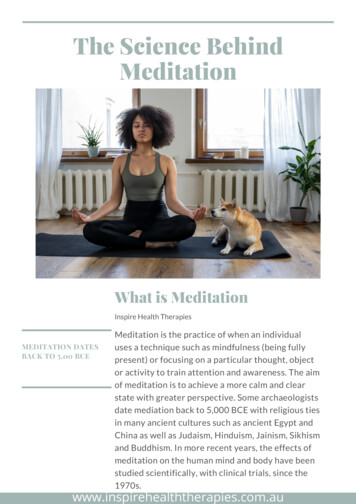
Transcription
The Science BehindMeditationWhat is MeditationInspire Health TherapiesMEDITATION DATESBACK TO 5,00 BCEMeditation is the practice of when an individualuses a technique such as mindfulness (being fullypresent) or focusing on a particular thought, objector activity to train attention and awareness. The aimof meditation is to achieve a more calm and clearstate with greater perspective. Some archaeologistsdate mediation back to 5,000 BCE with religious tiesin many ancient cultures such as ancient Egypt andChina as well as Judaism, Hinduism, Jainism, Sikhismand Buddhism. In more recent years, the effects ofmeditation on the human mind and body have beenstudied scientifically, with clinical trials, since the1970s.www.inspirehealththerapies.com.au
Some Commonmyths aboutmeditationYou are not meditating properlyif you are having wanderingthoughts – meditation is aboutdetaching from, and observing,your thoughts without judgementas they come and go rather than‘turning off” your thoughts.Meditation is not about changingyour internal state but ratherabout observing it and acceptingit, this is what leads to us feelingmore clear, calm and present.Meditation should be relaxing – itis common, particularly at first, toexperience some anxiety anddiscomfort while meditating. Thisis usually because we are notused to sitting with our thoughtsand viewing them withoutdistraction. Sometimesuncomfortable thoughts maypresent themselves or our mindmight seem racing oruncontrollable. This is normal andwith continual practice andpatience it will get easier.Meditation takes hours –meditation can range anywherefrom a couple of minutes to a fewhours or even days. It is up to youhow long you wish to meditate aslong as you practice it regularly.www.inspirehealththerapies.com.au
What are thedifferent ways tomeditate?There are many different forms ofmeditation. The following are some ofthe most common, however, thesecan often be combined and overlapeach other:Mindful meditation – becomingaware of present thoughts oractionsTranscendental meditation –using a mantraGuided meditation – followingalong to instructionsVipassana meditation –meditation through attention tosensations in the body (typicallytaught as a 10-day course)Loving Kindness Meditation –directing well wishes towardsothersYoga meditation – meditatingwhile practicing yogaMeditation can either be doneformally, by sitting for a committedamount of time and focusing onbodily sensations such as the breathor mantras, or informally, forexample, staying present whilebrushing your teeth, going for a walkor doing yoga.www.inspirehealththerapies.com.au
What does researchsuggest aboutmeditation?Research has shown that meditation candecrease blood pressure, symptoms ofirritable bowel syndrome, anxiety,depression and insomnia. Furthermore,a 2005 study by the MassachusettsGeneral Hospital even found thatmeditation can increase brain thickness(the number of neurons) in the PreFront Cortex (area of the brainresponsible for high order brain functionlike impulse control, memory,comprehension, creativity, reasoningand emotion regulation). These findingshave also been replicated in many otherstudies.Meditation can therefore allow us togain greater control over ourattention, emotions, impulses andreasoning and increases our ability tostay present and tap into creativity. Itthen follows that when we practicemeditation regularly, we are happier,feel more in control, able to manageour thoughts and emotions and leadmore satisfying lives.Although any amount of meditation isbeneficial, most research concludesthat 10 minutes a day for at least 8weeks is the minimum amount of timerequired to see these significantphysical and mental benefits. Althoughthere is also a lot of research to showthat regular practice is much moreimportant than duration of eachmeditation when it comes to seeingeffects.www.inspirehealththerapies.com.au
TipsStart small – start with 5-10 minutesof meditation per day and thenincrease the time from thereFind meditations that work for you –there are many different ways tomeditate, take some timeexperimenting with what type ofmeditation works best for you. Doyou enjoy mantras? Imagery? Guidedmeditations? Breath work? Yoga?Have some fun exploring youroptions.Get comfortable when you practiceyoga – put on some comfy clothes,adjust the room temperature ifpossible, put on a scented candle andsome mood lighting. Makemeditating an enjoyable daily ritual.Stick with it! - Practice is key withmeditation. There may be some dayswhen you just don’t feel likemeditating and that is completelynormal but try and stick with it. Tryto do at least do 5-10 minutes a day,it will get easier and easier tomotivate yourself to do this.If you would like to try meditation andaren’t sure where to start why not tryour ‘5 Best 5-Minute Meditations onSpotify’!ResourcesHow long has mediation been orybuddhism/#: :text nd%2C%20of%20course%2C%20Buddhism.Study on meditation and 72874/Amount of time required to htherapies.com.au
Transcendental meditation - using a mantra. Guided meditation - following. along to instructions. Vipassana meditation - meditation through attention to. sensations in the body (typically. taught as a 10-day course) Loving Kindness Meditation - directing well wishes towards. others. Yoga meditation - meditating while practicing yoga





